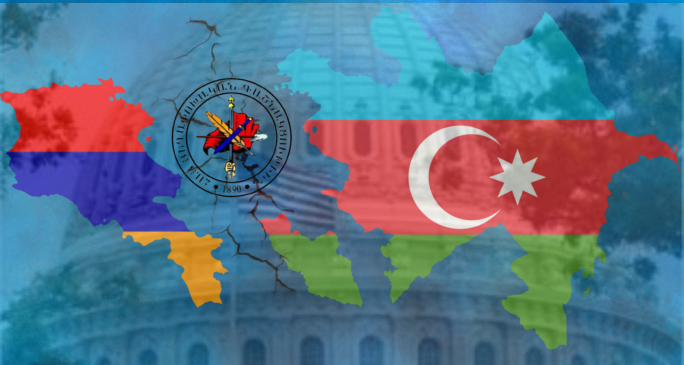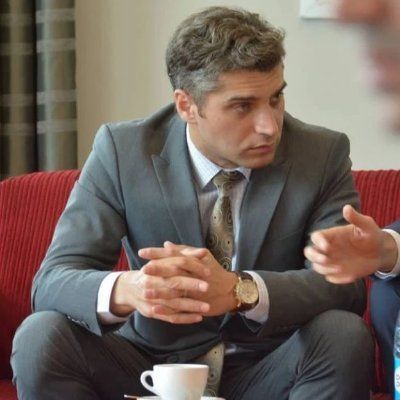Diaspora groups push provocations as Baku-Yerevan relations slowly improve

The recent wave of lobbying by Armenian diaspora groups in the United States represents a concerted attempt to undermine Washington’s decision to waive Section 907 of the Freedom Support Act in favor of Azerbaijan. Section 907, enacted in 1992, restricts direct U.S. aid to Azerbaijan, and its waiver by former President Trump was part of a broader effort to stabilise the South Caucasus, encourage post-conflict reconstruction, and promote reconciliation between Azerbaijan and Armenia. Despite these intentions, Armenian revanchist groups continue to frame Azerbaijan as the "aggressor in the Nagorno-Karabakh" conflict, perpetuating narratives of “ethnic cleansing” and human rights violations.
The Armenian diaspora, particularly organizations such as the Armenian Revolutionary Federation (ARF) Hay Dat Committee, has mobilized its well-established networks in Washington to apply political pressure against Azerbaijan. The U.S. State Department’s 2024 Human Rights Report on Azerbaijan has been seized upon by these groups to argue that the Trump administration’s waiver of Section 907 rewards human rights violations and emboldens "Azerbaijani aggression". The diaspora’s reports highlight allegations of arbitrary killings, torture, unlawful imprisonment, and the destruction of cultural heritage in Garabagh. References to the UN Committee against Torture’s 2024 findings, Freedom House reports, and media investigations such as those by Bellingcat are repeatedly cited to construct a narrative of Azerbaijan as systematically committing "ethnic cleansing" and "erasing" the "Armenian presence" in Garabagh.
However, this narrative omits critical context and undermines efforts to achieve a sustainable peace between Baku and Yerevan. Before the 2020 war and the subsequent territorial reintegration, Azerbaijan repeatedly extended offers for ethnic Armenians who had lived in Garabagh to retain residency and accept Azerbaijani citizenship. These proposals were rejected, and instead, Armenian forces claimed these territories in contravention of international law, leading to the long-standing conflict that only recently saw a framework for reconciliation emerge. By refusing these offers, Armenian actors effectively chose to maintain a separatist enclave rather than integrate peacefully into Azerbaijan’s legal and civic system.
Despite this history, diaspora groups continue to push an agenda that frames Azerbaijan as the sole perpetrator and portrays Armenian communities as victims without acknowledging their prior legal and political choices. The recent memorandum presented by Hay Dat to the U.S. Congress reiterates the claim that ongoing detention, destruction of cultural sites, and displacement continue, urging the imposition of sanctions, invocation of Section 907, and application of the Global Magnitsky Act against Azerbaijani officials. These lobbying efforts often overlook the broader peace context, including the U.S.-brokered agreements between Azerbaijan and Armenia, which are designed to normalise relations, facilitate the return of displaced persons, and promote economic and cultural cooperation.
Here is an impirtant nuance to pay attention:
From the 1990s up until the Second Karabakh War in 2020, the Armenians living in Karabakh—and later artificially settled from Lebanon, Syria, and other Middle Eastern countries—are not officially acknowledged by Armenia today. In contrast, during the Soviet period, Azerbaijan maintained detailed records of the Armenian population living alongside Azerbaijanis in Karabakh, including statistics on how many Armenians lived in each village.
Estimates indicate that by 2020, fewer than 20,000 Armenians actually remained in the liberated Garabagh. The escalation of tensions led many former Armenian residents to voluntarily migrate to Russia and other countries. During the Second Garabagh War itself, it was even noted that Armenians from Syria were present. From combat tactics to technical preparation, it is undeniable that Armenians, some of whom had previously fought alongside ISIS factions, were brought to Garabagh.
Revanchist narratives in US challenge peace progress in South Caucasus
hus, the diaspora’s approach is both political and strategic. By mobilizing public opinion through platforms such as anca.org/realpeace, Armenian advocacy groups aim to pressure U.S. lawmakers to obstruct military and economic assistance to Azerbaijan. They emphasize human rights claims, including the detention of Armenian prisoners of war and destruction of cultural heritage, portraying these as evidence of systemic Azerbaijani aggression. While human rights and accountability are legitimate concerns under international law, the framing often ignores Azerbaijan’s documented efforts to reintegrate territories, rehabilitate infrastructure, and offer returns to displaced populations.
This advocacy also risks destabilizing the recent thaw in Baku-Yerevan relations. By promoting unilateral punitive measures against Azerbaijan, diaspora groups challenge the incremental progress of normalization, which has included agreements on transportation corridors, border demarcation discussions, and cooperative economic projects. The narrative of ongoing “ethnic cleansing” disregards the legal and historical context of the conflict and conflates wartime incidents with broader policy choices. It also undermines international law principles that emphasise state sovereignty and negotiated settlement over diaspora-driven unilateral accusations.
The U.S. State Department’s report, while documenting allegations, does not legally compel the re-invocation of Section 907. Trump’s decision to waive the provision aligns with broader U.S. strategic interests in stabilising the South Caucasus and facilitating peace. The Armenian diaspora’s efforts, however, seek to reverse this policy through lobbying, media campaigns, and congressional pressure, emphasizing punitive measures over dialogue. By doing so, these groups risk re-entrenching hostility and creating conditions for renewed confrontation rather than reconciliation.
It is also significant that Armenian revanchist groups frame their argument as a continuation of historical grievances. They invoke international human rights norms selectively while ignoring Azerbaijan’s repeated offers for peaceful integration and citizenship. This selective narrative has been a hallmark of diaspora lobbying, which often prioritizes political influence in Washington over constructive engagement with the realities on the ground in Azerbaijan. In doing so, these campaigns perpetuate a cycle of mistrust and tension, complicating the very processes designed to bring lasting peace.
Finally, the Armenian diaspora and its lobbying apparatus in the United States are actively attempting to provoke political action against Azerbaijan by leveraging allegations of human rights violations and ethnic cleansing. Their narrative, however, omits the context of prior Azerbaijani offers of citizenship and reintegration, which were rejected. These efforts run counter to the ongoing U.S.-facilitated peace process and the broader goal of regional stability. While accountability for human rights is crucial, a balanced approach that recognises both historical and contemporary realities is essential. Continued lobbying in the U.S. risks undermining incremental reconciliation efforts, reinforcing revanchist claims, and threatening the fragile normalization of Azerbaijan-Armenia relations.
Here we are to serve you with news right now. It does not cost much, but worth your attention.
Choose to support open, independent, quality journalism and subscribe on a monthly basis.
By subscribing to our online newspaper, you can have full digital access to all news, analysis, and much more.
You can also follow AzerNEWS on Twitter @AzerNewsAz or Facebook @AzerNewsNewspaper
Thank you!

